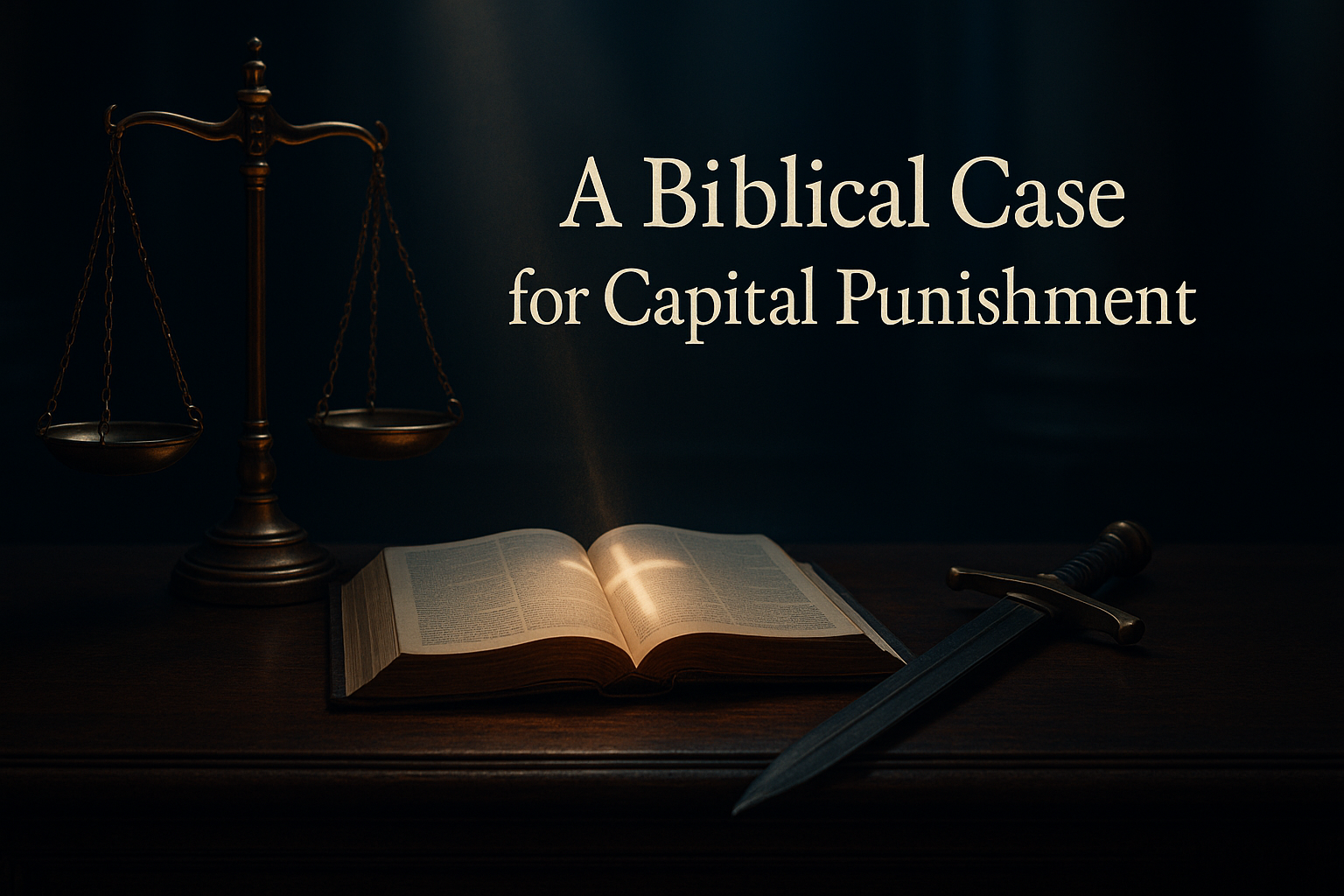Christians should never treat life-and-death questions as abstractions. Capital punishment is not a political cudgel; it is a grave matter of justice, human dignity, and obedience to God’s design. When we let Scripture—not sentiment—set the terms, a sober, careful case emerges: the Bible authorizes the state, under strict safeguards, to impose the death penalty for the most serious crimes, especially murder, precisely because human life bears the image of God.
The starting point is the sanctity of life in Genesis 9:6: “Whoever sheds the blood of man, by man shall his blood be shed, for God made man in His own image.” This command is embedded in the Noahic covenant, given to humanity at large before the Law of Moses and therefore not limited to Israel’s national code. The logic is not vengeance but value. Human life carries immeasurable worth because people bear God’s image, and the severity of the penalty reflects the priceless worth of the victim. Far from cheapening life, the passage guards it with the strongest earthly sanction.
When Scripture later details Israel’s civil law, it does not unleash bloodlust; it restrains it. The Mosaic framework established due process, impartial judges, and a clear distinction between intentional murder and accidental killing. One witness was never enough to secure a death sentence; the standard required two or three credible witnesses, rejecting hearsay and bribery and insisting that the innocent must not be condemned (Deuteronomy 17:6; 19:15; Exodus 23:7). The cities of refuge made intent central, giving shelter to those who killed unintentionally while reserving the ultimate penalty for deliberate murder (Numbers 35; Deuteronomy 19). Even the well-known phrase “eye for eye” functioned as a limit, not a license; it calibrated proportional justice so punishment would fit the crime rather than escalate it (Exodus 21:23–25). In other words, the same law that allowed for capital punishment also wrapped it in procedures that honored truth, required moral certainty, and forbade partiality.
Much confusion evaporates when we acknowledge the difference between murder and lawful execution. The sixth commandment forbids murder—unlawful, intentional killing (Exodus 20:13). Scripture itself presupposes that not all taking of life is morally equivalent. If the commandment banned every instance of killing in every context, God’s own case law about courts and penalties would contradict the Decalogue, which it does not. The Bible is coherent: it forbids murder and, in limited cases and with strict safeguards, permits the state to wield the sword against those who unlawfully destroy the image of God.
Biblical wisdom also warns against a justice system that refuses to act. Ecclesiastes 8:11 observes that when sentence against an evil deed is delayed indefinitely, people can become emboldened to do evil. The point is not to rush cases or short-circuit appeals; the point is that justice must be real, careful, and timely rather than theoretical and negligent. A society that treats lawlessness with performative outrage but no consequences invites further lawlessness.
The New Testament does not erase civil authority; it clarifies it. Romans 13:1–4 teaches that governing authorities are God’s servants for the common good and that the ruler “does not bear the sword in vain,” language that recognizes lethal authority as part of the state’s vocation when used justly. First Peter 2:13–14 commands Christians to submit to human authorities sent to punish those who do evil and praise those who do good. Paul himself acknowledges that there are crimes “deserving death,” even as he insists he has committed none (Acts 25:11). Jesus tells Pilate that the governor’s authority comes “from above,” a sobering reminder that even a corrupt magistrate exercises delegated authority from God (John 19:10–11). On the cross, the repentant thief admits, “We are receiving the due reward of our deeds,” and Jesus does not dispute the court’s right to punish; He saves a soul within the framework of earthly justice (Luke 23:41). The famous episode in John 8 does not overturn the Law’s penalties; it exposes a lawless, hypocritical attempt at mob execution without proper process and witnesses. Christ defends the Law’s integrity, not vigilante cruelty.
Justice and mercy are not enemies. At the cross they meet, each in full. God assigns distinct roles: the Church proclaims the gospel, tends to the afflicted, and advocates fairness; the state restrains evil and rewards good. Supporting the state’s limited, careful use of the death penalty in the worst cases is not a vote against mercy. It is a recognition that moral order matters and that the sanctity of life is upheld when murder is treated as the highest violation of God’s image. Mercy can and must reach the condemned with the call to repentance and the promise of forgiveness in Christ, even when civil consequences remain.
None of this permits a cavalier posture toward the risk of wrongful conviction. The biblical case anticipates and answers that concern by demanding stringent evidence, rejecting coerced testimony, condemning bribes, and warning explicitly against shedding innocent blood. A Christian defense of capital punishment is inseparable from a Christian demand for moral certainty, equal justice, and scrupulous process. When the standard cannot be met, the sword must remain sheathed. When bias is exposed, it must be corrected. When evidence is tainted, it must be rejected. Justice must be as holy as the God whose character it reflects.
The bottom line is straightforward. God dignifies human life by attaching the severest earthly penalty to its unlawful destruction. God limits human power by building due process, impartiality, and proportionality into the administration of justice. God authorizes civil authority to restrain evil—even with the sword—while calling the Church to announce mercy that can change hearts. That vision is not cruelty; it is ordered righteousness. It is not vengeance; it is justice under God. And it is not a denial of grace; it is the stage on which grace does its deepest work, even at the eleventh hour.
In an age that often confuses compassion with permissiveness and justice with rage, Scripture cuts a straighter path. Value life absolutely. Hate murder resolutely. Demand courts that tell the truth, protect the innocent, and hold the guilty to account. Then, while the state does its God-given duty, let the Church do hers: call every sinner, condemned or free, to the Savior who forgives, cleanses, and makes all things new.



